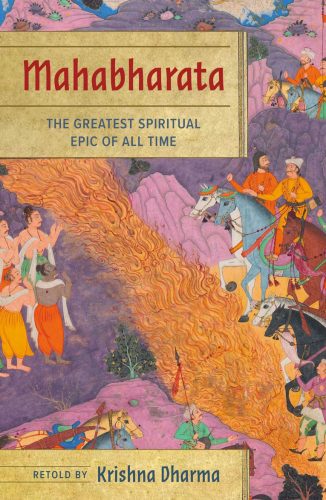The Indian epic poem Mahābhārata (“The Great Story of the Bhārata”), composed of one hundred thousand verses in Sanskrit, is the largest poetic composition in the world. Its earliest version, dating back to the 4th century BC, is called Jaya, meaning “triumph” or “victory,” and is attributed to the poet Vyāsa. According to legend, Brahmā, the Creator of the Universe, granted Vyāsa a vision of the entire work, which Vyāsa then transcribed with the help of the elephant-headed deity, Ganesha. The text, initially known as Bhārata from Java, was transmitted orally at royal courts, growing in both quality and quantity as each storyteller added new elements. By around 400 BC, the work was named Mahābhārata. It narrates the heroic deeds and intrigues of two branches of a family, the Pāṇḍavas and the Kauravas, who are cousins and clash in a bloody battle in the ancient city of Hastināpura. The epic includes numerous digressions, such as the Bhagavadgītā, a philosophical reflection on life and human conduct. Before the conflict between the Pāṇḍavas and the Kauravas begins, the god Krishna reveals to Arjuna the importance of fulfilling one’s duty with detachment and absolute dedication.

Peter Brook first brought the Indian epic poem Mahābhārata to the stage and later to the big screen. The original cinematic adaptation was nine hours long, which was eventually reduced to six and then to three hours to facilitate its theatrical ...
